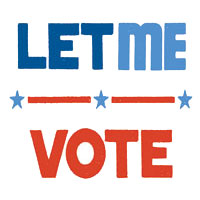Voting is a sacred American value. It gives each citizen their say in a government “of the people, by the people, for the people” While we may not agree on values or even the means to achieve shared objectives, we can agree that every eligible voter deserves unimpeded access to the ballot.
Opportunities to vote, however, have been challenged on numerous fronts in recent years. No political party has been immune to disenfranchising voters and in recent years, we have seen purging of voter registration rolls, cutting early voting hours and ending Golden Week, the one week period during early voting that allows voters to register and vote on the same day.
Going to Court to Protect the Vote
When politicians manipulate voting laws, the ACLU steps in to protect access to the ballot. In NAACP, et al. v. Husted, the ACLU and several Cleveland community churches stopped cuts to early voting in Ohio and secured a settlement with the Secretary of State to reinstate evening and weekend voting. Extended voting is of particular benefit to people of color and low-income voters who work long hours, have important family commitments, or lack sufficient transportation. Weekend hours also help churches in organizing "Souls to the Polls” Sundays, especially on the weekend before the election.
Check out our Vote Center for vital information about registration and voting, becoming a poll worker, and what your rights are when casting your ballot.
Filed in 2006,
The Northeast Ohio Coalition for the Homeless (NEOCH), et al. v. Husted has been a long-standing lawsuit that has led to a series of voter restrictions struck down. NEOCH has challenged technical rules that threw out Ohio absentee and provisional ballots with minor mistakes and prevented poll workers from assisting voters unless they declared they had a disability or were illiterate. The lawsuit also challenged two bills. The first required voters to provide their date of birth and address on an absentee ballot and shortened by three days the amount of time voters casting provisional ballots had to produce identification. The second required election boards in each county to reject absentee and provisional ballots for errors made on identification statements, a rule inconsistently applied across Ohio’s 88 counties.
Just last week, we stood before the 6th Circuit Court of Appeals to argue that Ohio’s voter purge program is illegally canceling hundreds of thousands of voter registrations.
Our lawsuit explains how this program violates federal law by punishing people for not voting. People will show up to vote on Election Day only to then discover they are no longer eligible to vote. In a key swing state during a highly contested election year, these voters could have a significant influence on the direction of our country.
Repercussions, Locally and Nationally
These lawsuits have had a tremendous impact on Ohio voters, and for other jurisdictions across the country.
NAACP v. Husted protected early voting, while the
NEOCH case ensured people of color and transient communities were not unfairly discriminated against by confusing and obscure voting instructions. Our challenge to Ohio’s voter purge program is pushing back against voter suppression in a key election year.
Read more about our lawsuit to stop Ohio’s voter purge program.
Ohioans who cherish the right to vote should be reminded that the fight to access the ballot does not end when “our” candidate is elected or when one powerful case is won. The government can challenge our right to vote with an outlandish new law or procedure at any time. Not only is it our civic duty to vote, but it is our obligation
to take action when
anyone’s right to vote is abridged or challenged.

